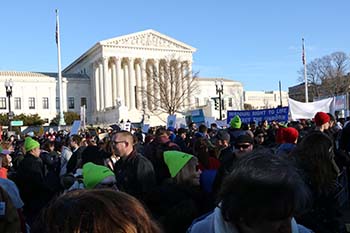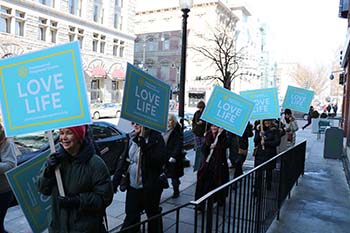WASHINGTON D.C.—People from across the nation and around world rallied Jan. 22 at the National Mall in Washington, D.C. for the annual March for Life just three days prior to the 45th anniversary of the U.S. Supreme Court’s decision that legalized abortion on demand across the nation.
A majority of the estimated 100,00-plus participants (no official counts are registered) appeared to be overwhelmingly teenagers and young adults who recognize the impact that the 1973 Roe v Wade decision has had on their generation. Many carried hand-made placards stating “One-third of my generation is missing,” referencing the more than 1 million babies, on average, aborted each year since 1973.

Photo by TEXAN
Forty-five years ago on Jan. 22 the U.S. Supreme Court declared abortion on demand legal across the nation. Every year since, the March for Life has ended its procession at the court’s steps where they demand the ruling be overturned.
And many donned t-shirts declaring “I survived Roe v Wade. Roe v Wade won’t survive me.” Often called “the Pro-life generation” by people their parents’ age or older, the TEXAN asked the high school and college students if the title is one they claim for themselves.
“It’s not something we decided to become,” Grady Moyer, a high school senior and member of Church at the Cross in Grapevine, Texas said. “But God worked in us.”
Moyer was among 32 students and young adults who traveled to D.C. for the march eager to add their voices to the call to end abortion. James Sercey, Church at the Cross student pastor, said he recognizes the March for Life is a significant event founded and organized by the Catholic Church. But he noted he would like to see more protestant churches add their voices to the nation’s largest pro-life demonstration.
To help facilitate that effort, the Southern Baptist Convention’s Ethics and Religious Liberty Commission and Focus on the Family hosted the third Evangelicals for Life Conference. The effort has focused on drawing more Protestant churches to the march and broadening their members’ perspective on what it means to be pro-life.
Only Leanne Jamison, among the 28 women from Prestonwood Baptist Church in Fort Worth, had attended the national march in the past. Hoisting teal-colored placards promoting the church’s pregnancy center and the admonition to “Love Life,” the band of women joined the flow of demonstrators leaving their hotel for the five-block walk to the mall and the sea of life-affirming compatriots.

Photo by TEXAN
Twenty-eight women from Fort Worth’s Prestonwood Baptist Church make their way to the National Mall for the 45th Annual March for Life.
Compelled by their belief that life is sacred they marched. But, as they passed the U.S. Capitol, some paused to consider their constitutional right to march, Jamison said.
Melanie Leach, one of the Prestonwood marchers, told the TEXAN that “as Americans we can do this—all walk together.”
“I am marching for our inalienable right to life,” she said.
The event marked the first time a sitting president spoke to the rally live via satellite. In his address from the White House Rose Garden, President Trump thanked marchers for their commitment to life while acknowledging America’s place among human rights abusing nations when it comes to abortion policies. Also, in an official statement recognizing the Roe v. Wade anniversary, Trump declared Jan. 22 as “National Sanctity of Human Life Day.”
“We are one of the only nations that still allows for late-term abortions,” Trump told the marchers. “This is wrong and needs to change.”
The march’s two-hour-long one-mile trek to the Supreme Court was broken by spontaneous singing, corporate prayers, and raucous chants of “We love babies, yes we do. We love babies, how ’bout you?” And, for good measure, a New Orleans Catholic high school marching band stood on the sidewalk and performed for grateful marchers passing by. (BP)
Bonnie Pritchett